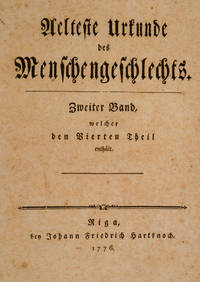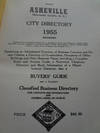
Aelteste Urkunde des Menschengeschlechts
by HERDER, Johann Gottfried
- Used
- first
- Condition
- See description
- Seller
-
Calabasas, California, United States
Payment Methods Accepted
About This Item
Riga: Johann Friedrich Hartknoch, 1774. The Oldest Document of the Human Race
Johann Herder Accuses Kircher of Willful Fabrication
HERDER, Johann Gottfried. Aelteste Urkunde des Menschengeschlechts. Riga: Johann Friedrich Hartknoch, 1774-1776.
First edition. Two quarto volumes (9 1/2 x 7 3/4 inches; 241 x 195 mm.). [iv], 384; [viii], 202 pp.
Late nineteenth century parchment over decorated paper boards, spines lettered and ruled in gilt.
A fascinating work on cosmogany and The Old Testament...
Aelteste Urkunde des Menschengeschlechts - The oldest document of the human race. Herder says in an earlier version of his Aelteste Urkunde, around 1771 or 1772: "Aber so wissen wir ja nicht das Alter der Welt!" (But we do not know the age of the world). The Book of Genesis, he says, can give us no information on this subject. But in 1774, in the final version of the same work, he says that "die Welt fast sechstausend Jahr alt... ist" (The world is almost six thousand years old). In a sermon of the same year, he says of the three Magi: "... viertausend oder Eins oder Zwei wars, da die Weisen ankamen" (...four thousand years and one or two wars, then came the wise men). Thus it appears that during his most religious phase, he came to accept the Biblical chronology that he had rejected two or three years previously.
Johann Gottfried von Herder (1744-1803) was a philosopher and literary critic, whose writings were instrumental in forming the European romanticism. As the leader of the Sturm und Drang movement, he inspired many writers, notably Goethe, the future leader of the German Romantics.
"In the same year, Herder published his Aelteste Urkunde des Menschengeschlechts and here his sneers at the Jesuit's unsuccessful but honest attempts became more open. In one place he expresses his longing to see ‘eine würkliche, ächte, alte Hieroglyphe', a piece of unnecessary irony, since Kircher's works did indeed contain accurate representations of Egyptian hieroglyphs. In the same sentence, Herder talks of ‘Kircherische Träume und Warburtonische Hypothesen'. Twice in this same work, in the section entitled ‘Aegyptische Götterlehre', Herder couples Kircher's name with that of Huet, and both times stresses the unreliability of the Jesuit's work. Herder made merry at this point at the expense of earlier pioneers in the field of Egyptian studies and lumped indiscriminately together the varied honest efforts that had helped to spread in Europe a first-hand knowledge of the hieroglyphs: ‘und die gelehrten Männer, Kircher und Huet auch fast so etwas in einer Symbole sahen, worum wieder andre gelehrte Männer Dom Martin, Clayton, Herwart, Pglug, Wanne und Kompass entdecken'. Of their endeavors, Herder aphoristically concludes: ‘Ein Punkt woran sie spannen, war immer Wahrheit: und alles, was sie spannen, war Traum'. In the same section, in attempting to summarize the Egyptian pantheon, Herder remarks - and again one wonders at the unnecessarily jibing style - ‘Ich bin weder Kircher noch Huet, und leite nichts her. Ich zeige nur, und was sich nicht von selbst durchs blosse Zeigen ergibt, lasse ich ruhig stehen'. It seems that Herder felt that Kircher had made willful fabrications.
The last reference to Kircher in this work is more justified. Herder expresses the idea that perhaps, after all, the Egyptian obelisks and other inscribed monuments were not the repositories of divine wisdom Kircher thought they were. In this, Herder follows Leibniz (Accessiones historicae) and precedes Zoega (De origine et usu obeliscorum). His remark has a certain judiciously ironic flavor: ‘mit eben so vielem Recht hatte Kircher die Geheimnisse des Jesuiterordens an den Pyramiden lesen können, als die Gehimnisse Aegytens. Geheimnisse schreibt man nicht an Thurm und Wände'. Herder returned to his derogatory ‘Kirchersche Träume' for a brief moment some fifteen years later when giving a reference for the work most suitable on the early origin of speech: ‘Die beste Schrift fur dise noch zum Theil unausgearbeitete Materie ist Wachteri naturae et scripturae concordia die sich von der Kircherschen und so viel andern Träumen, wie Alterthumsgeschichte von Märchen unterscheidet'. Herder refers here to Kircher's views, admittedly a little ingenuous, on the production of sound, contained in his Musurgia of 1650. More alarming than Herder's academic disagreement is the fact that he seems perfectly ready to use his expression ‘Kirchersche Träume' in a manner that is more generic than specific. It is perhaps fortunate, at least as far as the Jesuit's ragged reputation was concerned, that Herder made no more academic references to his works." (Fletcher, pp. 380-381).
Johann Herder Accuses Kircher of Willful Fabrication
HERDER, Johann Gottfried. Aelteste Urkunde des Menschengeschlechts. Riga: Johann Friedrich Hartknoch, 1774-1776.
First edition. Two quarto volumes (9 1/2 x 7 3/4 inches; 241 x 195 mm.). [iv], 384; [viii], 202 pp.
Late nineteenth century parchment over decorated paper boards, spines lettered and ruled in gilt.
A fascinating work on cosmogany and The Old Testament...
Aelteste Urkunde des Menschengeschlechts - The oldest document of the human race. Herder says in an earlier version of his Aelteste Urkunde, around 1771 or 1772: "Aber so wissen wir ja nicht das Alter der Welt!" (But we do not know the age of the world). The Book of Genesis, he says, can give us no information on this subject. But in 1774, in the final version of the same work, he says that "die Welt fast sechstausend Jahr alt... ist" (The world is almost six thousand years old). In a sermon of the same year, he says of the three Magi: "... viertausend oder Eins oder Zwei wars, da die Weisen ankamen" (...four thousand years and one or two wars, then came the wise men). Thus it appears that during his most religious phase, he came to accept the Biblical chronology that he had rejected two or three years previously.
Johann Gottfried von Herder (1744-1803) was a philosopher and literary critic, whose writings were instrumental in forming the European romanticism. As the leader of the Sturm und Drang movement, he inspired many writers, notably Goethe, the future leader of the German Romantics.
"In the same year, Herder published his Aelteste Urkunde des Menschengeschlechts and here his sneers at the Jesuit's unsuccessful but honest attempts became more open. In one place he expresses his longing to see ‘eine würkliche, ächte, alte Hieroglyphe', a piece of unnecessary irony, since Kircher's works did indeed contain accurate representations of Egyptian hieroglyphs. In the same sentence, Herder talks of ‘Kircherische Träume und Warburtonische Hypothesen'. Twice in this same work, in the section entitled ‘Aegyptische Götterlehre', Herder couples Kircher's name with that of Huet, and both times stresses the unreliability of the Jesuit's work. Herder made merry at this point at the expense of earlier pioneers in the field of Egyptian studies and lumped indiscriminately together the varied honest efforts that had helped to spread in Europe a first-hand knowledge of the hieroglyphs: ‘und die gelehrten Männer, Kircher und Huet auch fast so etwas in einer Symbole sahen, worum wieder andre gelehrte Männer Dom Martin, Clayton, Herwart, Pglug, Wanne und Kompass entdecken'. Of their endeavors, Herder aphoristically concludes: ‘Ein Punkt woran sie spannen, war immer Wahrheit: und alles, was sie spannen, war Traum'. In the same section, in attempting to summarize the Egyptian pantheon, Herder remarks - and again one wonders at the unnecessarily jibing style - ‘Ich bin weder Kircher noch Huet, und leite nichts her. Ich zeige nur, und was sich nicht von selbst durchs blosse Zeigen ergibt, lasse ich ruhig stehen'. It seems that Herder felt that Kircher had made willful fabrications.
The last reference to Kircher in this work is more justified. Herder expresses the idea that perhaps, after all, the Egyptian obelisks and other inscribed monuments were not the repositories of divine wisdom Kircher thought they were. In this, Herder follows Leibniz (Accessiones historicae) and precedes Zoega (De origine et usu obeliscorum). His remark has a certain judiciously ironic flavor: ‘mit eben so vielem Recht hatte Kircher die Geheimnisse des Jesuiterordens an den Pyramiden lesen können, als die Gehimnisse Aegytens. Geheimnisse schreibt man nicht an Thurm und Wände'. Herder returned to his derogatory ‘Kirchersche Träume' for a brief moment some fifteen years later when giving a reference for the work most suitable on the early origin of speech: ‘Die beste Schrift fur dise noch zum Theil unausgearbeitete Materie ist Wachteri naturae et scripturae concordia die sich von der Kircherschen und so viel andern Träumen, wie Alterthumsgeschichte von Märchen unterscheidet'. Herder refers here to Kircher's views, admittedly a little ingenuous, on the production of sound, contained in his Musurgia of 1650. More alarming than Herder's academic disagreement is the fact that he seems perfectly ready to use his expression ‘Kirchersche Träume' in a manner that is more generic than specific. It is perhaps fortunate, at least as far as the Jesuit's ragged reputation was concerned, that Herder made no more academic references to his works." (Fletcher, pp. 380-381).
Reviews
(Log in or Create an Account first!)
Details
- Bookseller
- David Brass Rare Books, Inc.
(US)
- Bookseller's Inventory #
- 03211
- Title
- Aelteste Urkunde des Menschengeschlechts
- Author
- HERDER, Johann Gottfried
- Book Condition
- Used
- Quantity Available
- 1
- Publisher
- Riga: Johann Friedrich Hartknoch, 1774
- Weight
- 0.00 lbs
Terms of Sale
David Brass Rare Books, Inc.
We will extend to you a 48-hour approval period on all items that are purchased sight unseen. If you are not completely satisfied with the item simply contact us within 48 hours after receipt, and then return it in the same condition you received it for a full refund, less freight charges, or any related costs including credit card transactions, taxes, and duties levied, especially when returning from other countries.
About the Seller
David Brass Rare Books, Inc.
Biblio member since 2007
Calabasas, California
About David Brass Rare Books, Inc.
David Brass Rare Books, Inc. specializes in buying and selling only the finest examples of English, American and European Literature, Children\\\'s Books, Color-Plate Books, Illustrated Books, Early Printed Books, Private Press Books, Fine Bindings, Original Artwork, Manuscripts, High Spot Modern First Editions, Rare Books and High Spots.
Glossary
Some terminology that may be used in this description includes:
- Parchment
- Pages or book covering made from a prepared animal skin. Parchment describes any animal skin used for books, while vellum is a...
- Inscribed
- When a book is described as being inscribed, it indicates that a short note written by the author or a previous owner has been...
- Quarto
- The term quarto is used to describe a page or book size. A printed sheet is made with four pages of text on each side, and the...
- First Edition
- In book collecting, the first edition is the earliest published form of a book. A book may have more than one first edition in...
- Gilt
- The decorative application of gold or gold coloring to a portion of a book on the spine, edges of the text block, or an inlay in...








